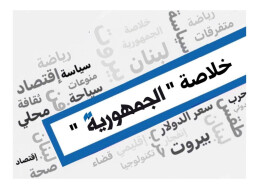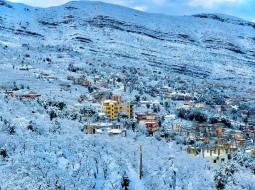
A new day of intense confrontations unfolded in the southern region, which was targeted by Israeli airstrikes, artillery, and phosphorus shelling.
In response, Hezbollah carried out a series of operations described as the fiercest since the start of the war, in retaliation for the assassination conducted by Israel in the town of Jouya. According to Israeli media, more than 200 rockets were launched from southern Lebanon towards areas in Galilee, northern Jordan Valley, the Golan Heights, the Shebaa Farms, and the occupied Kafr Shuba hills. This is the largest number of rockets fired by Hezbollah in one day since October 8, following the killing of one of Hezbollah's leaders.
Hezbollah has vowed to escalate.
Meanwhile, the Grand Serail witnessed a series of diplomatic meetings discussing the current situation in Lebanon and the region, and efforts to stop the Israeli aggression on southern Lebanon. The ambassadors expressed their countries' readiness to help.
Regionally, a senior military official in the northern command of the Israeli army said that Israel is "preparing to face rocket launches and also preparing for a strong response in Lebanon."
Regarding the latest developments in the ceasefire deal in Gaza, Hamas indicated that it seeks written guarantees from the United States for a permanent ceasefire and the withdrawal of Israeli forces from the sector in order to sign a truce proposal supported by Washington.
Qatar's Prime Minister and Minister of Foreign Affairs, Sheikh Mohammed bin Abdulrahman Al Thani, confirmed that there is a clear and firm call to end the war in Gaza. He stated that the current ceasefire proposal for Gaza is the best way to bridge the gaps between Hamas and Israel. He emphasized that reaching an exchange and truce deal requires concessions from both sides.
Additionally, Iran's Acting Foreign Minister pointed out that "we will not allow Israel to achieve its goals in Lebanon." He advised Israel not to fall from the Gaza pit into the Lebanon well.
Internationally, a United Nations investigation concluded that Israel committed crimes against humanity during the military operation it launched in the Gaza Strip after October 7. The investigation also concluded that both sides of the conflict, Israel and Hamas, committed war crimes during the initial months of the war.
Elsewhere, U.S. Secretary of State Antony Blinken stressed that President Joe Biden's proposal is the best chance on the table to end the suffering in Gaza. He noted that "Hamas has proposed changes to Biden's proposal, some of which are feasible," pointing out that some of Hamas's demands regarding the proposed deal cannot be met.
Statements from White House National Security Advisor Jake Sullivan regarding Hamas's changes to the ceasefire proposal contradicted Blinken's announcement. Sullivan said that the changes proposed by Hamas are minor and that the United States will work with Egypt and Qatar to bridge the gaps in the proposal.
In France, President Emmanuel Macron addressed French voters, confirming that calling for early parliamentary elections was his only course of action. He urged all those who oppose far-right parties to ally with him.
Meanwhile, Ukrainian President Volodymyr Zelensky arrived in Jeddah and met with Saudi Crown Prince Mohammed bin Salman.
The U.S. expanded its sanctions against Russia to include Chinese suppliers, imposing new sanctions on over 300 entities and individuals, including dozens of Chinese suppliers, to prevent Russia from obtaining the products and services needed to enhance military production for the Ukraine war.
Economically, the International Energy Agency predicted a "significant surplus" in oil supplies by 2030.




.jpeg?w=260&h=190&fit=crop)







.jpg?w=260&h=190&fit=crop)




.jpeg?w=255&h=190&fit=crop)


